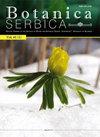Micromorphology of an involucral bract and cypselae of the endemic and relict species Amphoricarpos elegans Albov (Asteraceae, Cardueae) from the Caucasus
IF 1.1
4区 生物学
Q4 PLANT SCIENCES
引用次数: 1
Abstract
In this study, micromorphology of an involucral bract and inner and outer dimorphic cypselae of the relict Amphoricarpos elegans, endemic from western Caucasus, is examined using a scanning electron microscope (SEM) and presented here for the first time. The middle involucral bract is nearly glabrous, with a reticulate-rugulose surface and an oblong-obtusate mucro. Both cypselae exhibit similar features, viz., narrowly oblong-cylindrical or obovate shape with more or less conspicuous longitudinal ribs, an adaxial detachment area, an asymmetrical carpopodium, absence of a pericarp crown and a barbate-aristate pappus made up of narrow, subulate, basally smooth and apically barbate bristles. However, some differences are evident. The outer cypsela is glabrescent and flattened, with an obscure outline of epidermal cells lacking an end wall and with a sunken periclinal surface and striatereticulate structure. Also, the outer cypsela has two entire, narrow, lateral wings, rounded above; and less numerous pappus bristles in one row. In contrast to this, the inner cypsela has a distinct outline of the epidermal cells, which are rod-shaped with a short acute end wall, a swollen periclinal surface and reticulate structure. The pappus of the inner cypsela possesses many more bristles organised in two rows (a biseriate pappus). Also, slightly pentagonal or round nectary remnants are found in the centre of the upper part of the inner cypsela. The taxonomic value of the analysed characters is briefly discussed.高加索地区特有和孑遗种双翅菖蒲(菊科,菖蒲科)总苞片和总苞片的显微形态学
本研究利用扫描电子显微镜(SEM)研究了西高加索地区特有的elegans两栖动物(Amphoricarpos elegans)遗存的总苞片和内外二态蝶瓣的显微形态。中间总苞片近无毛,具一网状锯齿状表面和一长圆状钝钝的短毛。这两种羽状体具有相似的特征,即狭长的圆珠形或倒卵形,纵棱或多或少明显,正面有分离区,羽柄不对称,没有果皮冠和由窄的、钻形的、基部光滑的、顶部为巴巴状的刚毛组成的羽状体。然而,有些差异是明显的。表皮细胞轮廓模糊,无端壁,周周凹陷,具条纹网状结构。此外,外伞具两个完整的,狭窄的,侧翅,上面圆形;并且在一排中有较少数量的乳头毛。与此相反,内cypsela表皮细胞轮廓清晰,呈杆状,端壁短而尖,周表面肿胀,呈网状结构。内囊的乳头具有更多的两排排列的刚毛(双列乳头)。此外,在内瓶盖上部的中心也有略呈五边形或圆形的蜜腺残余。简要讨论了所分析性状的分类学价值。
本文章由计算机程序翻译,如有差异,请以英文原文为准。
求助全文
约1分钟内获得全文
求助全文
来源期刊

Botanica Serbica
Agricultural and Biological Sciences-Plant Science
CiteScore
1.40
自引率
12.50%
发文量
17
审稿时长
34 weeks
期刊介绍:
Botanica Serbica publishes original research papers on all aspects of plant, fungal and microbial biology research including the disciplines of microbiology, mycology, lichenology, bryology, flora, vegetation, biogeography, systematics, taxonomy, plant biotechnology, plant cell biology, plant ecology, environmental plant biology, forestry, genomics, horticulture, limnology, metabolomics, molecular biology, proteomics, virology, plant conservation and protection, and wildlife and ecosystem management.
 求助内容:
求助内容: 应助结果提醒方式:
应助结果提醒方式:


